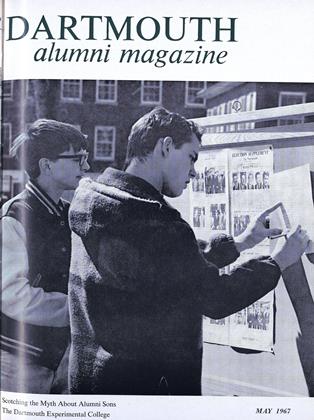ByHadley Cantril '28. New Brunswick, N. J.:Rutgers University Press, 1967. 202 pp.$7.50.
Reading this "simple narrative" sets up many memories going back to my first teaching days when Had Cantril sat in my discussion-group class (when the spirit moved and his supply of cuts ran low); the reading of his other books (and some briefer writings) as they appeared, starting with his delightful Psychology of Radio and The Invasion from Mars (the panic following the Orson Welles Halloween dramatization); and another channel takes me to another student who has become a leader in social psychology - Charlie Osgood '39. Both Had and Charlie have been trying to do much the same thing: to offer their services as professional psychologists to — as Had puts it in the first sentences in the Preface to this book - "inject a way of thinking into policy formulation at the highest levels of Government. This 'way of thinking' consists essentially of using all necessary psychological factors in the formulation of any given problem."
It would be an unkindness to review this book in detail; it needs to be read without summary or explanation. Here is the "simple narrative" of one professional scholar's attempts to place his expertise at the disposal of the policy makers during times of crisis: from FDR's problems through the Eisenhower days, and to a lesser degree for the Kennedy administration. It was Had's first impulse to publish these "examples of my experiences in policy research" posthumously; friends persuaded him this was false modesty, and so we are the gainers. He starts with the Cuban and Dominican Republic fiascoes and what his techniques offered might have prevented or "at least mitigated" what happened. He also tells what these techniques are and the theory behind their use. Then he devotes the bulk of this short book to illustrations "of different types of policy research: discovering and reporting the state of mind of people, learning how aware they are of issues that require policy decisions and how research can help find the right expression of policy at the right time so as to reach the people more effectively."
The final chapter states the problem of injecting psychological considerations into Government policy; a study in frustration, I should think, where Government asks help from experts but mistrusts their advice. This is nothing new, for ever since World War I, when psychologists of various persuasions were asked to apply their expertise to manpower problems, the same paradox has prevailed; in advertising-selling-marketing, psychological research has been invited and also (sometimes, I admit, with cause) been attacked. Here the "chips were very blue." Wondering what might have happened if... is fantasy; hoping for better liaison in the future may be more profitable.
Professor of Psychology Emeritus
 View Full Issue
View Full Issue
More From This Issue
-
 Feature
FeatureScotching the Myth About Alumni Sons
May 1967 By RAYMOND SOBEL, M.D. -
 Feature
FeatureThe Humanistic Pursuit of Values
May 1967 By ROBIN J. SCROGGS -
 Feature
FeatureThe Dartmouth Experimental College
May 1967 By ROBERT B. REICH '68 -
 Feature
FeatureRefugees' Friend
May 1967 -
 Feature
FeatureManhattan Realtor
May 1967 -
 Feature
FeatureBotanic Director
May 1967
CHAUNCEY N. ALLEN '24
-
 Letters to the Editor
Letters to the EditorLetters to the Editor
JAN./FEB. 1980 -
 Class Notes
Class Notes1924's 30th "Best of All"
July 1954 By CHAUNCEY N. ALLEN '24 -
 Books
BooksDOLLARS FOR YOU.
June 1958 By CHAUNCEY N. ALLEN '24 -
 Class Notes
Class NotesThirty-fifth Reunion for 1924
JULY 1959 By CHAUNCEY N. ALLEN '24 -
 Class Notes
Class Notes1924's 40th
JULY 1964 By CHAUNCEY N. ALLEN '24 -
 Books
BooksPROPAGANDA COMES OF AGE.
NOVEMBER 1965 By CHAUNCEY N. ALLEN '24
Books
-
 Books
BooksFACULTY PUBLICATIONS
May 1916 -
 Books
BooksBIBLIOGRAPHY OF TEXAS
March 1956 By HAROLD G. RUGG '06 -
 Books
BooksLEBENDIGE LITERATUR.
May 1961 By HERBERT R. SENSENIG '28 -
 Books
BooksPSYCHOLOGY OF PERSONALITY
February 1949 By Irving E. Bender. -
 Books
BooksStories With Purpose
SEPTEMBER | OCTOBER 2020 By JOSEPH BABCOCK '08 -
 Books
BooksCRAZY WHITE MAN.
February 1953 By ROBERT MCKENNAN '25

